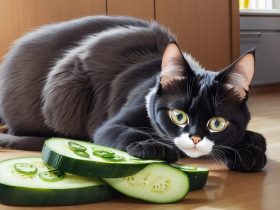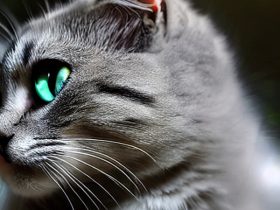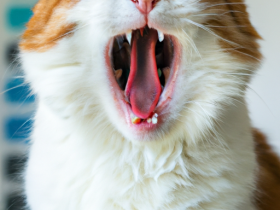Why Does My Cat Vibrate?
The Mystery of Feline Vibration Solved!
Introduction
Have you ever noticed your cat vibrating? It’s a weird and often amusing phenomenon, but it’s also one that has real significance in your feline family member’s life. This article explores the reasons why cats vibrate and explains the benefits of this behavior.
Q&A: What is Cat Vibrating?
Cat vibrating is a behavior where a cat shakes or trembles slightly. It often looks like an involuntary jerking motion, though cats are fully aware of what they are doing. The vibration can range from a gentle shaking to intense trembling and is usually accompanied by a purring sound.
Why Do Cats Vibrate?
There are a few reasons why your cat might be vibrating:
- Contentment: Cats may vibrate when they are feeling content, such as after a meal or when being petted.
- Stress: Some cats vibrate when they are feeling stressed or anxious.
- Pain: Sometimes cats may vibrate when they are experiencing pain or discomfort.
- Nervousness: If your cat is in an unfamiliar environment, they may be vibrating out of nervousness.
Are There Any Benefits To Cat Vibrating?
Yes! Cat vibrating can actually have benefits for your pet. When cats vibrate, they are effectively releasing endorphins, which are hormones that make them feel good. This helps cats relax and is a great way to reduce stress. Vibrating also helps cats self-soothe and can even release natural pain killers if they are experiencing pain.
Conclusion
If your cat is vibrating, don’t worry—it’s a perfectly normal behavior for cats. Understanding why cats vibrate can help you better respond to the behavior and make sure your feline family member is feeling their best. As long as there are no other signs of illness or injury, vibration is likely a sign of relaxation and should be enjoyed rather than discouraged!
What causes cats to vibrate involuntarily?
Cats are sometimes seen to vibrate involuntarily due to a variety of medical conditions and external stimuli. It is typically caused by either excitement, fear, or neurological conditions. It can be triggered by seeing food, being petted, or seeing something perceived as a threat. In more serious cases, it can be caused by a neurological disorder such as feline hyperesthesia syndrome.
What are the symptoms of a cat having an involuntary vibration?
The main symptom of a cat having an involuntary vibration is tremors or muscle twitching. This is observed as a rhythmic shaking of the body or jerky, uncontrollable movements of the limbs. In severe cases, the cat may experience seizures or have difficulty walking or standing. Other symptoms can include drooling, rapid breathing, anxiety, and restlessness. A commonly asked question that many pet owners have is why their cats vibrate. It is a behaviour often observed in felines, however, it is not well understood by many people. Vibrating is a behavior that cats will often execute when experiencing a strong feeling of pleasure.
By vibrating, cats are essentially vibrating their muscles in order to emotionally express their happy state. It is a physical expression of pleasure that is seen among many animals. Cats in particular seem to make a more intense response by pulsing or twitching their entire body when they are feeling an extraordinary amount of joy.
Certain environmental factors, such as petting and cuddling, can induce a powerful sensation of pleasure in cats. When petting your cat, you may be able to feel a subtle vibration of the muscles which indicates that your cat is very content and happy. This is a normal behavior that cats tend to exhibit when feeling content and relaxed. It should not be a cause for concern, but rather a sign of your cat’s satisfaction.
It is important to note that vibrating cats may also be displaying some form of tactile stimulation. When cats are stroked along the spine it can activate nerves that cause muscles to contract, leading to involuntary tremor-like twitches or waves of vibrations. This is a sign of relaxation and does not signify any medical issue.
In rare cases, vibrating may be a sign of a medical condition such as an underlying neurological disease. So if your cat is experiencing these symptoms, it may be best to seek veterinarian advice just in case.
In conclusion, cats vibrating is a common behavior seen in felines, and is a physical expression of pleasure. Environmental factors such as petting and cuddling can induce a strong emotion in cats, causing them to vibrate. However, sometimes it may be a result of an underlying neurological condition, which is why if it persists, it is best to visit the veterinarian to rule out any medical issues.








Leave a Reply
View Comments